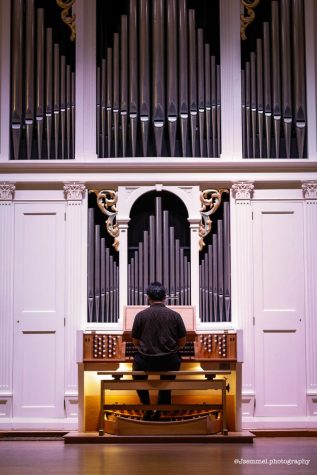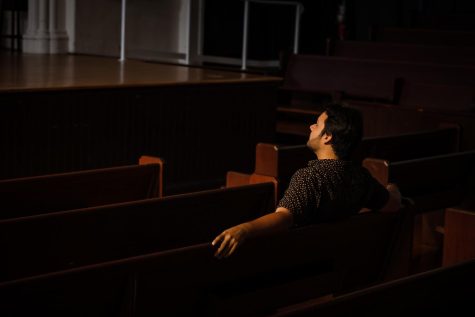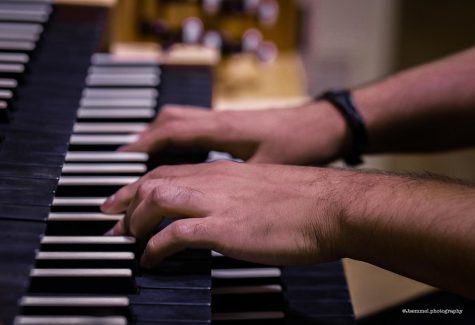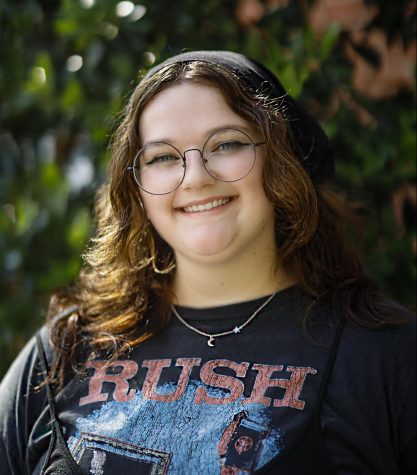AMPERSAND: With Alexander Ortiz Vélez
Across linguistic and cultural barriers, music serves to bridge the gap that words often cannot. Alexander Ortiz Vélez, a Stetson student studying musical composition, understands this phenomenon quite personally.
October 4, 2022
Across linguistic and cultural barriers, music serves to bridge the gap that words often cannot. Alexander Ortiz Vélez, a Stetson student studying musical composition, understands this phenomenon quite personally.

Alexander began taking music lessons at an early age in Puerto Rico, where he grew up with his family. He learned music theory, how to play the piano, and about how music can foster connection in each of his classes. This education followed him to Florida, where he has lived for the last several years. In his interview, he shared that his English at the time he moved to Florida “wasn’t great,” but he found that composition “was [his] true way of connecting with…myself.”
Thus, music became the great communicator for Alexander as he overcame the language barriers he faced moving to a predominantly English-speaking area. We discussed his experiences of music and how it serves as a form of communication, and Alexander stated that “feelings [are] a universal language,” and the immense feeling and emotion that can be found in music. He believes that because music is also a “universal language,” people can understand each other through it without necessarily needing the complex conventions of traditional language.
Alexander’s passion for the arts brought him to Stetson University, which he cites as a foundation for his study of music and composition. He is a pianist, keyboardist, and organist and spends much of his time composing unique pieces. Alexander says that he enjoys listening to all genres of music, from Baroque to modern jazz. “I just love what people have to show me,” he said in the interview, delighted to share his taste in music.
Alexander also has a deep passion for social justice and encouraging dialogue. As a musical director at a local church, he has the unique opportunity to engage with the community via music. “I never saw myself as an actual organist at a church,” he laughed, noting that this gig was not even on his radar prior to coming to Stetson. However, Alexander maintains that he is thankful for the opportunity.
He believes that music is one of the most effective ways to promote action and advocacy in communities, often communicating what words simply cannot. He said that one of the greatest joys of his job is using his creativity and platform to speak to his congregation, and “empower them to do work in the community.” One of his goals during his time with the church is to be able to connect with local youth music organizations to help teach children to play the organ.
Alexander mused about how the music he composes and plays encourages listeners to explore their spirituality, no matter their religious or cultural identity. “It’s…sacred music, but in a way that anyone can connect.”

While the encouragement of spiritual exploration presents a challenge for some who are not used to the idea, Alexander encourages this discomfort. “It’s rewarding to challenge the tradition,” he says, telling me about how he uses his music to create a culture of acceptance and exploration in the church. He sees the value in thinking deeply about what you believe and why, and allowing your views to be challenged or reframed.
Alexander brings this belief to the very core of his music. On January the 6th, 2021, Alexander sat down at his piano and began to compose as he watched the tragedy at the Capitol unfold on television. His piece, titled “January the 6th,” was composed in real time with the events, inspired by the emotions Alexander felt as he watched the news coverage. He feels as though it is important for folks to hear this piece in order to understand his feelings during the event, no matter their views on the incident.
It is crucial that artists and musicians use their talents to encourage dialogue between different beliefs and ideologies, as Alexander implies through his actions. While words may lead to fallout and strife, music and art can effectively communicate to an audience what would otherwise be torn down.
When asked what advice he would give to artists and musicians who are beginning their careers at Stetson, Alexander simply says, “Be open.” In Alexander’s case, he had no idea that he would one day become the musical director of a local church, using his position to inspire community engagement and social justice through his art.
While his journey at Stetson may not look like he had originally planned, it has nonetheless been a wonderful opportunity for growth and learning in the field of music. So, incoming creative minds, be open to changes in your path. Do not turn a blind eye to challenges or disruption in normalcy. Opportunities that you may have once thought impossible, or perhaps never even considered, may be the catalyst for success in your time here at Stetson.
Across the barriers of language and spirituality, Alexander has been able to use music to promote connection and growth. Where many may see stagnation, Alexander sees endless opportunities for progress through rhythm and melody.








